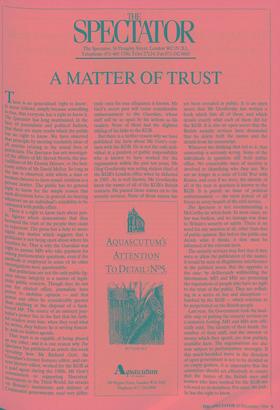The Spectator, 56 Doughty Street, London WC1N 2LL Telephone: 071-405
1706; Telex 27124; Fax 071-242 0603
A MATTER OF TRUST
there is no generalised 'right to know'. It never follows, simply because something IS true, that everyone has a right to know it. The Spectator has long maintained, in the face of journalistic and political fashion, that there are many truths which the public has no right to know. We have observed that Principle by steering resolutely clear of all articles relating to the sexual lives of politicians. The Spectator has not investigat- ed the affairs of Mr Steven Norris, the pec- cadilloes of Mr Dennis Skinner, or the bed- room antics of Mr David Mellor. So long as the law is observed, with whom a man or Woman chooses to have sexual relations is a Private matter. The public has no general right to know for the simple reason that such diversions have, in general, no bearing Whatever 'on an individual's suitability to be entrusted with public office. There is a right to know facts about pub- lic figures which demonstrate that they betrayed the trust of the people they claim to represent. The press has a duty to inves- tigate any matter which suggests that a politician is not being open about where his loyalties lie. That is why the Guardian was right to pursue MPs who take payment for asking parliamentary questions, even if the methods it employed in some of its other investigations were questionable. But politicians are not the only public fig- ures whose integrity is a matter of legiti- mate public concern. Though they do not 11.111 for elected office, journalists have Power to mobilise opinion — and that Power can often be considerably greater hthan anything at the disposal of a back- bench MP. The source of an eminent jour- nalist's power lies in the fact that his faith- fu. 1 readers trust him: when they read what .he writes, they believe he is writing honest- ly, With no hidden agenda. That trust is as capable of being abused as any other, and it is one reason why The Spectator has published an article this week revealing how Mr Richard Gott, the Guardian's former features editor, and cur- rent literary editor, worked for the KGB as a paid agent during the 1980s. Mr Gott's commitment to supporting 'liberation' movements in the Third World, his attacks 021 Britain's institutions and defence of Communist governments, read very differ-
ently once his true allegiance is known. Mr Gott's secret past will cause considerable embarrassment to the Guardian, whose staff will be as upset by his actions as his readers. None of them had the slightest inkling of his links to the KGB.
But there is a further reason why we have published the facts about Mr Gott's con- tacts with the KGB. He is not the only indi- vidual in a position of public responsibility who is known to have worked for the organisation within the past ten years. Mr Oleg Gordievsky was acting station chief of the KGB's London office when he defected in 1985. As is well known, Mr Gordievsky knew the names of all of the KGB's British contacts. He passed those names on to the security services. None of those names has yet been revealed in public. It is an open secret that Mr Gordievsky has written a book which lists all of them, and which details exactly what each of them did for the KGB. It is also an open secret that the British security services have demanded that he delete both the names and the details from his manuscript.
Whatever the thinking that led to it, that censorship is seriously wrong. Some of the individuals in question still hold public office. No conceivable issue of security is involved in identifying who they are. We are no longer in a state of Cold War with Russia, and even if we were, the identity of all of the men in question is known to the KGB. It is purely an issue of political embarrassment — the most potent of all forces in every branch of the civil service.
The Spectator is not recommending a McCarthy-ite witch-hunt. In most cases, no law was broken, and no damage was done to Britain's security or safety. There is no need for any sanction at all, other than that of public opinion. But before the public can decide what it thinks, it first must be informed of the relevant facts.
The security services may feel that if they were to allow the publication of the names, it would be seen as illegitimate interference in the political arena. But the opposite is the case: by deliberately withholding the information, MIS and MI6 are protecting the reputations of people whb have no right to the trust of the public. They are collud- ing in a series of lies and deceptions — hatched by the KGB — which continue to be perpetrated on the British people. Last year, the Government took the laud- able step of putting the security services on a statutory footing. MI5 and MI6 now offi- cially exist. The identity of their heads, the number of their staff, and the amount of money which they spend, are now publicly available facts. The organisations are also now subject to parliamentary oversight. If this much-heralded move in the direction of open government is not to be derided as an empty gesture, it is imperative that the committee should act effectively to ensure that the names of the British men and women who have worked for the KGB are released to its members. For once, the pub- lic has the right to know.


































































 Previous page
Previous page